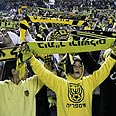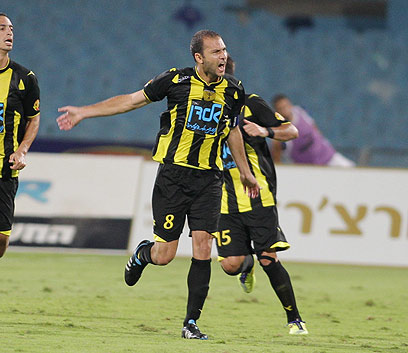
Beitar paying price for racist fans
As only major Israeli team never to include Arab player on its roster, Beitar Jerusalem is now under heavy pressure – particularly after series of run-ins with local football authorities over supporters' behavior
As the only major Israeli team never to integrate, Beitar Jerusalem is now under heavy pressure – particularly after a series of run-ins with local football authorities over racist behavior by its fans.
That may not be easy. Club management says its hands are tied by a hardcore base of fans who wield significant clout over personnel decisions. It has even called on police to rein in the worst offenders – an infamous group known as "La Familia."
"We are against racism and against violence and we pay a price for our fans," said Assaf Shaked, a team spokesman. "But we aren't going to bring an Arab player just to annoy the fans."
Beitar – which has won six league championships and seven cup titles in its 76-year history – has historically been strongly aligned with Israel's nationalist right wing. Its name, Beitar, comes from the Zionist youth movement that is linked to the ruling Likud party.

Beitar players. 'Against racism and violence' (Photo: Reuven Schwartz)
For decades, the team, like the Beitar movement, viewed itself as a perennial outsider while the establishment was controlled by the dovish Labor party and its offshoot in the sports world – the various Hapoel, or "workers," teams.
In 1976, Beitar finally won its first cup championship, and the following year Likud rose to power for the first time, ushering in a sea change in Israeli politics and sports. The team and its fans have since been a steady source of support for Likud politics.
A string of politicians have served as team chairman. Prime ministers with Likud roots – from Ariel Sharon to Ehud Olmert to Benjamin Netanyahu – have called themselves fans and made pilgrimages to the club's Teddy Stadium.
'Give Toto a banana!'
Beitar's fans are notoriously – and proudly – abusive toward opposing players, and routinely taunt them with racist and anti-Arab chants.
The Israeli Football Association says it has had enough. It recently ordered Beitar to play before an empty stadium and docked it two points in the standings after fans made monkey noises toward Hapoel Tel Aviv's Nigerian-born striker Toto Tamuz, a former Beitar player and fan favorite.
"Give Toto a banana!" they shouted.
League spokesman Amir Ephrat said the Beitar fans have pushed things too far, and the team has to take a tougher stand.
"This kind of extremism has to be dealt with before it expands," he said. "It has to be quashed when it is still small, because when it gets bigger it becomes a lot harder to stop."
Beitar's history of shunning Arab players has become especially noticeable in recent seasons. Arabs, who make up about 20% of Israel's population, now star on the Israeli national team and on every first division team besides Beitar. This year, the league's top two goal scorers are Arabs.
The league's battle with Beitar – and the team's own struggle with its rogue fans – comes as world football is cracking down on racism.
Earlier this month, a British parliamentary committee announced it would investigate racism in sports following a number of high-profile cases. Racism cases involving players and fans are being dealt with in France, Bulgaria and Spain as well.
As the Likud party has become more mainstream after years in government, the Beitar team's die-hard fans have gone the other direction.
In 2005, the "La Familia" organization was created, and it quickly became the team's loudest and most visible supporters. The fans routinely wave huge flags of the outlawed racist Kach party, whoop like monkeys when opposing black players touch the ball and chant "death to Arabs" and other racist slogans toward Arab players.
The club has been penalized numerous times for the behavior of its fans, which has included booing during a moment of silence for slain Prime Minister Yitzhak Rabin, singing songs deriding the Prophet Muhammad and physically assaulting Arab maintenance workers in stadiums.
Police spokesman Micky Rosenfeld said police were responsible for security outside the stadiums and for enforcing general public order - not fan behavior.
'We represent Jerusalem, not the Arabs'
For years, the club's Russian-Israeli owner Arcadi Gaydamak refrained from intervening. In fact, he backed the group financially and glowed in their adoration. After a failed attempt to run for Jerusalem mayor, Gaydamak fled the country in 2008 amid financial scandals in Israel and Europe.
Since then, Gaydamak has drastically cut funding to the team and tried to sell it.
First it was Brazilian-American millionaire Guma Aguiar who stepped in with a $4 million investment – before he checked himself into a psychiatric hospital because of increasingly erratic behavior that included plans to rebuild the biblical Jewish Temple in Jerusalem.
Last year, a pair of American businessmen agreed to buy the club – only to back out at the last moment. The team finished the season in 11th place in the 16-team league, narrowly avoiding relegation to the second division. This year, Beitar Jerusalem has fallen even further and is currently in danger of relegation.
In this environment, the fans' anger has grown. It is now no longer aimed solely toward Arabs – but against team management as well.
Most of the ire is directed toward General Manager Itzik Kornfein, a former Beitar goalkeeping great who has spoken out against racism. Fans often curse at him outside team practices. Some have even attempted to attack him physically.
The Beitar policy of shunning Arab players resurfaced last month when Maccabi Haifa striker Mohammed Ghadir said he would be willing to transfer to Beitar. Even before Beitar fans had their say, Ghadir withdrew the suggestion after Arab fans accused him of being a traitor.
"We would love to bring an Arab player on board but the conditions are not yet ripe – not as far as a player is concerned and not as far as the fans are concerned," said Shaked, the team spokesman.
He said fans need to go through "a learning process" before an Arab player could be added. He appears to be correct.
"Beitar is a team of Jews. Just like the army won't bring in a Chinese soldier, Beitar won't bring in an Arab player, because when there is a war and you have to give your all, they will run," said Shahar Darly, an-18-year-old fan.
"We represent Jerusalem, the capital of Israel, the state of the Jews, not the Arabs ... if they try to bring an Arab player, we won't let them."










